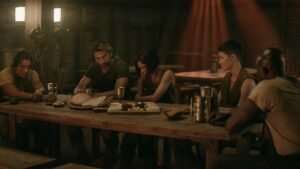Remedy Entertainment is known for it’s story-rich third-person shooters. Fans come back game after game for the engaging plots and unique takes on familiar themes. Quantum Break, Remedy’s latest title that is currently topping Xbox One sales charts, is a culmination of the Finnish studio’s strengths and ingenuity, combining game play with a digital TV series. It demonstrates their drive to continuously innovate the art of storytelling.
Set in a present day fictional-Boston-esq city, Jack Joyce and Paul Serene develop time manipulating powers as the result of a time travel experiment gone wrong. The world itself is affected by the accident, causing fractures in reality which disrupt the space-time continuum. It is up to Jack and his brother William to set things right, all the while evading soldiers from the mysterious Monarch Solutions, a corporation determined to stop Jack. This action packed, sci-fi, third-person shooter showcases the broad storytelling talent Remedy games are known for.
CGM had an opportunity to speak with Thomas Puha,Head of Media and Partners at Remedy Entertainment, about Quantum Break and what went into its production.
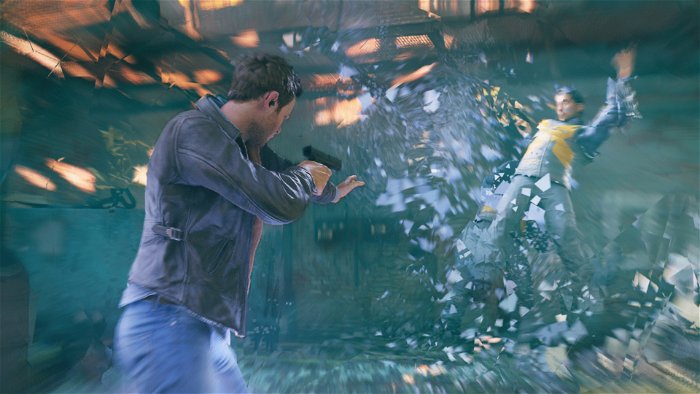
CGM: It’s an ambitious and bold choice to infuse gameplay with a digital TV series. What brought that idea forward and what was the experience like?
Thomas Puha: Well, that’s not going to be a short answer. In all of our past games (Max Payne 1 and 2, and Alan Wake), we’ve played around with live action to various extents. There was a little bit of it in Max Payne, and in Alan Wake we have an in-game show that you could find; a short film. But we’ve always been keen on live action, and when we started working on Quantum Break all those years ago, we had the idea of having live action scenes, but on a smaller scale.
Later, we thought we could – and maybe should- go bigger [with the live action scenes]. What we really wanted to do – and our creative director felt strongly about this – is that we should try to expand on the live action and use it to try to convey the story from the villain’s perspective. The game is about the hero and the show is about the villain.
TV is a medium that is interesting to us, as scenes are focusing on a different set of characters. It just made sense to use a different medium of storytelling because we had the opportunity. And we had to make sure that the game’s story worked together with the live action story because it’s a package. The game had to make sense, even if you don’t watch the show.
Making games is complicated, and what people probably don’t understand is , if we animated 20 minute and what people probably don’t understand is if we animated 20 minute video game cutscenes…we would need an army of animators, lighting artists and animators. We don’t have access to that in Finland. Since there’s no animation industry here, our animation team is small. When we had the chance to work with live action, we had an idea, and we believed we could pull it off, so we decided, “let’s do it.”
We started with an idea for how we could do the live action. It was supposed to be on a small scale, and then it just grew. It took a long time to figure out [the logistics], since we make third-person action games…With the core mechanics, we knew what it was going to be, but because we have the time travel element, it too a long time to figure out [how that would work with] the game mechanics themselves and what you are able to do and how all that stuff works.
CGM: So in order to do coordinate all of that, I understand the team created an engine specifically for Quantum.
TP: Yes, so we have the Northlight Storytelling engine that we built in-house. We’ve used a lot of other technology as well, developed outside of Remedy, but the engine is ours. It’s just a very Scandinavian thing; a lot of other big Scandinavian video game developers develop their own technology. We’re very much an engineering nation. It’s just something we do. Our engine and our tools are designed to tell a good story, from anything from the field of view to the lenses we use to the lighting; everything is there to serve our aspirations. We want to make very cinematic looking games. The tools are there to make sure that we get to that end result.
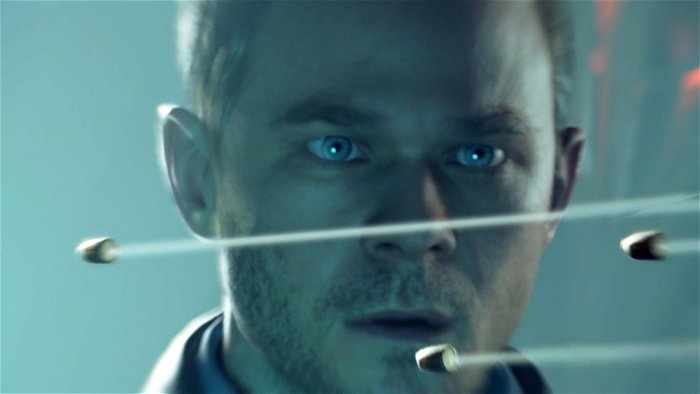
CGM: So let’s go back to the storytelling universe. How did the idea for the time travel universe come about?
TP: Our creative director, Sam Shay, had the idea for Quantum already a long time ago when we were working on Alan Wake. It was sort of part of the Wake storyline that got cut out very early on, you know quantum theory and quantum physics and black holes and that sort of thing. Sam had an idea for that called Quantum. Once we had shipped Alan Wake we started talking about what we should do next and that’s sort of how it started. [Sam also wanted to explore this line of thinking:] like if you could go back in time what would you change and what could you change. That’s sort of the very central, core idea of Quantum Break- can you change things? Can you change what happens?
Time travel stories are very complicated. There are great time travel stories out there like Looper or Primer which are great movies. Obviously we looked at those and Terminator too – people sort of forget that this is a time travel movie – and it went from there. We had couple of writers on the team and time travel was something they wanted to explore. It took years to make the logic of time travel in the game very sound, so that there were no loopholes. That took a long time.
CGM: According to other sources, I understand that the creative team worked with a theoretical physicist who had worked with CERN to verify a lot of the science behind the story. Is this true?
TP: No, we were definitely inspired by CERN, but we worked with a Finnish scientist. We consulted him a little bit all those years ago when we started forming the ideas for the project just to explain how we could make time travel work. We came to him [with questions] like how would you theoretically do it with black holes and these sorts of things so we do try to stay grounded in reality.
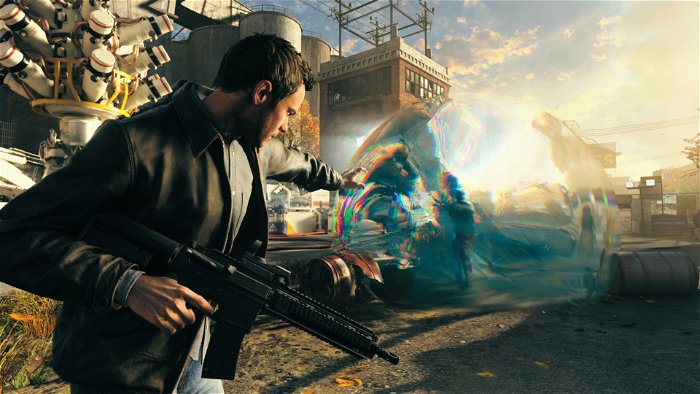
CGM: Having delayed the release date, do you and the team feel that you’ve accomplished everything you wanted to get out with this game?
TP: That’s a loaded question in many ways. From my personal standpoint, the video game industry has to get a lot better about speaking to [consumers]. I know people think that studios release a movie at weird times. Movies are complex things that involve thousands of people and visual effects. Video games are kind of the same, but you gotta think software. We’re always doing new things. We had to create the visuals, we had to update our engine to work on the Xbox One. All these things take time, so you never know what to expect.
We’ve taken a long time with this game. We want to make really good games, and we want to make more games. Microsoft gave us the chance to work on the game, so we had to make the live action and the game work together. Now, we’re storytellers and artists, so we work on everything up until the very last minute. It’s our [perfectionist] nature. Games come together at the last minute. People that see games developed would be very scared during the last month. Like, “OK, thank god it works.” Of course we [feel that we] could always use more time. Ask anyone who writes a movie or album or book; do they want to have more time to read things? Of course I do. But you have to at some point ship the game. It’s not perfect, but you have to put it out. Still, we’re happy with what we have for sure.
CGM: In terms of working with Microsoft, what keeps you coming back and making exclusive titles for them?
TP: We have a long relationship with Microsoft. Remedy is an independent company – we’re not owned by Microsoft – but we’ve been working with Microsoft for ten years. Like every relationship you have your ups and downs. But we know each other. Microsoft wants a Remedy game. They want story driven games that we do well. They like to focus on the story, and that’s great. We look at Quantum’s marketing, (it’s something I’ve been involved in) and it’s great stuff. There are trailers, there’s TV ads, lots of visibility in print and online, and these sorts of things are what a big publisher can do, which is awesome. [Microsoft’s team is] working long hours and weeks, and there are big events for Quantum in specifically Brazil and that’s awesome to see. Microsoft knows what they’re going to get with a Remedy game and that’s awesome.
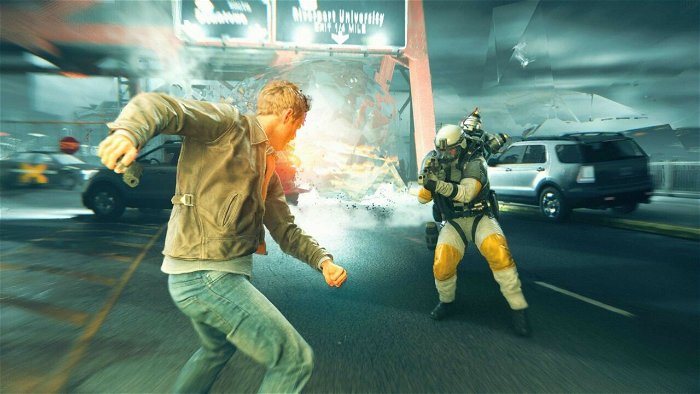
CGM: You’ve received very positive reviews from the critics, how does that feel?
TP: Thank you. There are a lot of really positive reviews, but we are seeing some negative. Our games have always been divisive, which is kind of good because there’s discussion. There are those who really don’t like Quantum Break, but the majority have really, really liked it. We hope they like it. There have been some surprising things like what characters people like, what they think about the story.
Of course, you can not please everybody. There’s discussion and there’s criticism, and we look at it and say, “yeah we need to do better next time.” We learn from every mistake we make. With video games it’s often the sequel that really knocks it out of the park, because so much work has already been done. For games, in the first game you’re creating the universe, figuring out the universe, figuring out the characters, and making the technology which takes years. In the sequel, pretty much all of that stuff is solved. The reception has been good. It allowed us to make something new and definitely different and divisive in some ways. Its rewarding to see how much discussion there is about the game.
CGM: Do you see a real potential for a possible sequel to Quantum Break?
TP: We’d love to do a sequel, but there’s no plan right now, and we need to see how people react to Quantum Break. This is a business after all. We definitely would have lots of ideas for it of course. We put everything-our heart and soul- into this game. It has a definite ending, but we always build these things with a franchise in mind, since we’ve already built the universe and everything. But in the end, the audience decides that.



